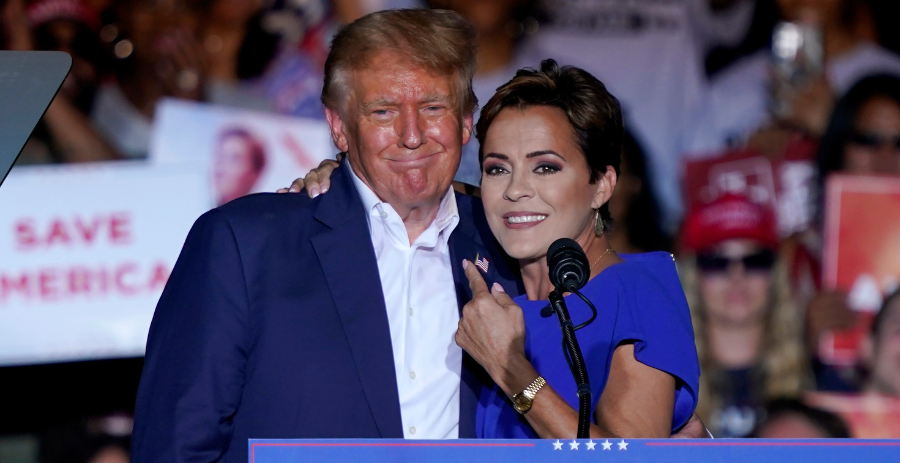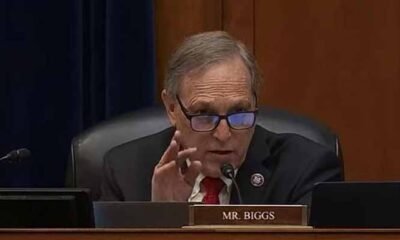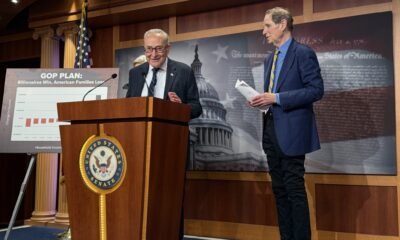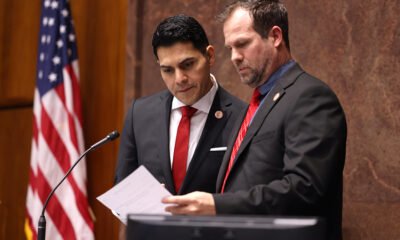2024 Election News
Crucial Arizona Senate Race Could Swing on Trump Supporters Embracing Democrats

PHOENIX (AP) — As the race for the U.S. Senate heats up in Arizona, Ruben Gallego faces a significant challenge: courting voters who supported Donald Trump. This election could hinge on his ability to attract a rare breed of ticket-splitters, particularly undecided Republicans.
Gallego’s battle is against former television news anchor Kari Lake, who shares the goal of reaching those undecided GOP voters. In today’s political climate, where loyalty to party is unwavering, gaining support from cross-party voters could be decisive for either candidate.
Voter Winfield Morris, a 62-year-old Republican rancher, exemplifies the dilemma. Though he plans to back Trump in the presidential race, he opposes Lake in the Senate battle. “I don’t like Kari Lake and I’m not going to vote for her,” Morris stated, indicating his dissatisfaction with her approach and past comments aimed at late Senator John McCain.
Morris favored Nikki Haley over Trump and supported Mark Lamb in the GOP primaries. He mentioned a desire to learn more about Gallego, hinting he might consider a write-in vote for Lamb, despite the latter’s loss in funding and visibility.
To retain control of the Senate, Democrats are focused on appealing to conservative voters in traditionally Republican strongholds. This strategy often involves leveraging established incumbents, such as Montana’s Jon Tester, who is attempting to attract cross-party support through advertising aimed at Republicans.
In a noteworthy ad, a supporter highlights Tester’s bipartisanship, noting his success in getting numerous bills signed into law by Trump. The struggle for Democrats is heightened in states like Ohio, where the competition between Sherrod Brown and Bernie Moreno continues to intensify.
In North Carolina, GOP candidate Mark Robinson’s troubled campaign reflects how the Trump factor can impact various races, as Republicans hope ticket-splitters will stick with Trump regardless of their discontent with local candidates.
Back in Arizona, Gallego is striving to replicate the success of recent Democratic victories. His campaign’s financial efficacy is notable; thus far, Democrats have significantly outspent Republicans in advertising, with figures standing at $60.7 million versus $16.4 million.
Gallego’s approach hinges on uniting the Democratic base and attracting independent and moderate Republican voters who may be disenfranchised by Trump’s candidacy. Political strategist Mike Madrid emphasizes the significance of split-ticket voters in the modern electoral landscape.
The candidates are crafting their messages to resonate with undecided Republicans, particularly through their focus on border security. Gallego’s tone is critical of the Biden administration, stating that “there is no plan” regarding federal policies affecting Arizona. Meanwhile, Lake counts on her unwavering support from Trump to galvanize her base.
Endorsements play a crucial role as well; Gallego has gained the backing of the Arizona Police Association, emphasizing his military background as a draw for conservative voters. At the same time, Lake leans on her close association with Trump to solidify her support among die-hard Republicans.
History suggests that ticket-splitting isn’t uncommon in Arizona. In 2020, while Trump narrowly lost the state, Republican Martha McSally did far worse, prompting some analysts to believe that many voters opted for a mix of party affiliations.
Gallego’s background as an Iraq War veteran and his rise from humble beginnings resonate with many Arizonans. “He’s a legitimate tough guy,” noted Democratic strategist Stacy Pearson, positioning Gallego as a relatable candidate for crossover voters.
In the ever-evolving political landscape of Arizona, both candidates are aware that the support of undecided voters could ultimately determine their fates come Election Day.
___
Associated Press writers contributed to this report.

















